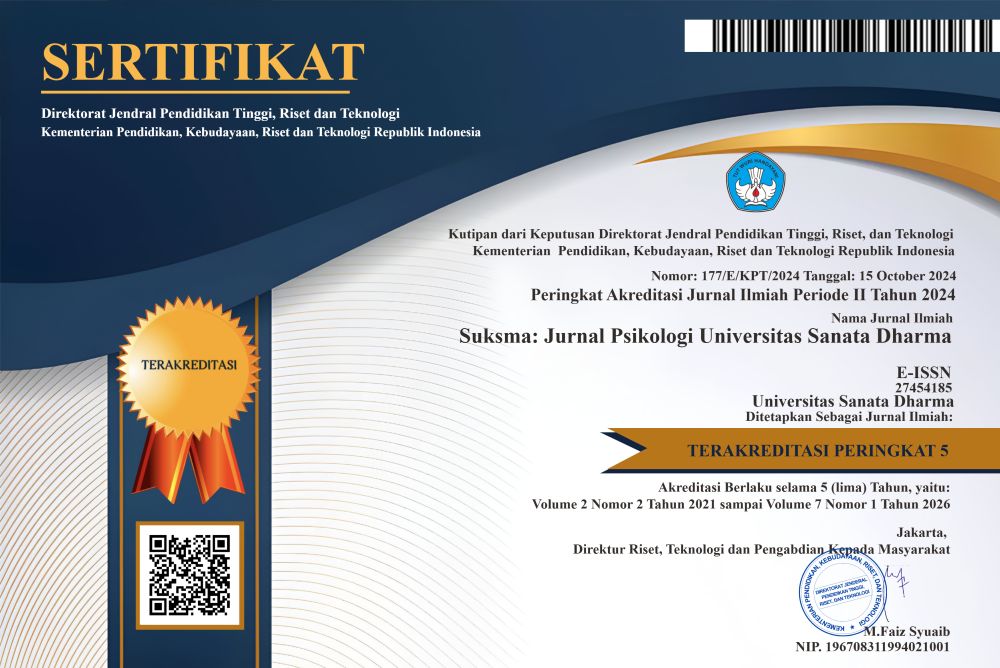Hubungan antara Kualitas Relasi dengan Saudara Kandung dan Kepuasan Hidup pada Dewasa Awal
(1)
(2)
(*) Corresponding Author
Abstract
This study aimed to determine the relationship between quality of sibling relationship and life satisfaction in emerging adulthood. The hypothesis of this study there was a positive and significant relationship between quality of sibling relationship and life satisfaction. The subjects of this study were 296 emerging adulthood aged between 18 to 22 years and who have the status of college student. The data collected by online surveys or google form. The tool used for collecting data was The Life Satisfaction and Quality of Sibling Relationship scale which was arranged by the writer and distributed using Likert scale. The Life Satisfaction scale had a reliability coefficient of 0,918 and Quality of Sibling Relationship scale had a reliability coefficient of 0,875. The data analysis technique in this study used Spearman correlation’s test with SPSS version 23. The result of this study showed that there was a positive and significant relationship between quality of sibling relationship and life satisfaction (r = 0,377, p = 0,000).
Full Text:
PDFReferences
Arnett, J. J. (1994). Are college students adults? Their conceptions of the transition to adulthood. Journal of Adult Development, 1(4), 213-224.
Botha, F. & Booysen, F. (2014). Family functioning and life satisfaction and happiness in South African households. Social Indicators Research, 119(1), 163-182. doi:10.1007/s 11205-013-0485-6
Diener, E. & Biswas-Diener, R. (2008). Happiness. Unlocking the mysteries of psychological wealth. Blackwell Publishing.
Diener, E. & Ryan, K. (2009). Subjective well-being: A general overview. South African Journal of Psychology, 39(4), 391-400.
Diener, E. (1984). Subjective well-being. Psychological Bulletin, 95(3), 542-575.
Diener, E. (1994). Assessing subjective well-being: Progress and opportunities. Social Indicator Research, 31, 103-157.
Diener, E., Emmons, R. A., Larsen, R. J., & Griffin, S. (1985). The satisfaction with life scale. Journal of Personality Assessment, 49(1), 71-75.
Doron, H. & Sharabi-Nov, A. (2016). Siblinghood, gender, and families: Are sisters more close and unified than brothers?. The Family Journal: Counseling and Therapy for Couples and Families, 24(4), 385-394. doi:10.1177/1066480716663174
Edwards, R., Hadfield, L., Lucey, H., & Mauthner, M. (2006). Sibling identity and relationships: Sisters and brothers. Taylor & Francis e-Library.
Evans, N. J., Forney, D. S., Guido, F. M., Patton, L. D., & Renn, K. A. (2010). Student development in college. Theory, research, and practice (2nd ed.). John Wiley & Sons, Inc.
Furman, W. & Buhrmester, D. (1985). Children’s perception of the qualities of sibling relationships. Child Development, 56, 448-461.
Hasanah, U. & Martiastuti, K. 2018. Interaksi keluarga: Sebuah tinjauan teoritis dan aplikatif. Depok: Karima.
Hindle, D. & Sherwin-White, S. (2014). Sibling matters: A psychoanalytic, developmental, and systematic approach. Karnac Books.
Hollifield, C. R. & Conger, K. J. (2014). The role of siblings and psychological needs in predicting life satisfaction during emerging adulthood. Society for the Study of Emerging Adulthood and Sage Publication, 1-11. doi: 10.1177/2167696814561544
Huebner, E. Scot. (2004). Research on assessment of life satisfaction of children and adolescents. Social Indicators Research, 66, 3-33.
Kong, F., & You, X. (2011). Loneliness and self-esteem as mediators between social support and life satisfaction in late adolescence. Springer, 110, 271-279. doi:10.1007/s11205-011-9930-6
Lam, C. B., Solmeyer, A. R., & McHale, S. M. (2012). Sibling relationship and empathy across the transition to adolescence. Journal Youth Adolescence, 41, 1657-1670. doi:10.1007/s10964-012-9781-8
Loewe, N., Bagherzadeh, M., Castillo, L. A., Thieme, C., & Foguet, J. M. B. (2013). Life domain satisfactions as predictors of overall life satisfaction among workers: Evidence from Chile. Social Indicators Research. doi:10.1007/s11205-013-0408-6
Maddux, J. E. (2018). Subjective well-being and life satisfaction. Routledge.
Martin, M. & Westerhof, G. J. (2003). Do you need to have them or should you believe you have them? Resources, their appraisal, and well-being in adulthood. Journal of Adult Development, 10(2), 99-112.
Oberle, E., Schonert-Reichl, K. A., & Zumbo, B. D. (2010). Life satisfaction in early adolescence: personal, neighborhood, school, family, and peer influences. Journal Youth Adolescence, 40, 889 – 901. doi: 10.1007/s10964-010-9599-1
Pavot, W. & Diener, E. (2008). The satisfaction with life scale and the emerging construct of life satisfaction. The Journal of Positive Psychology, 3(2), 137-152. doi:10.1080/17439760701756946
Ponappa, S., Bartle-Haring, S., Holowacz, E., & Ferriby, M. (2016). The family system and depressive symptoms during the college years: Triangulation, parental differential treatment, and sibling warmth as predictors. Journal of Marital and Family Therapy. doi:10.1111/jmft.12175
Santrock, J. W. (2012). Perkembangan masa hidup (edisi ketigabelas jilid dua). (Benedictine Widyasinta, Terj.). Penerbit Erlangga. (Judul asli diterbitkan pada tahun 2011).
Sirgy, M. J. (2012). The psychology of quality of life: Hedonic well-being, life satisfaction, and eudaimonia (2nd ed.). Springer.
Smorti, M. & Ponti, L. (2018). How does sibling relationship affect children’s prosocial behaviors and best friend relationship quality? Journal of Family Issues, 1-24. doi:10.1177/0192513X18755195
Tucker, C. J., Holt, M., & Martin, D.W. (2013). Inter-parental conflict and sibling warmth during adolescence: Associations with female depression in emerging adulthood. Psychological Reprot: Relationships & Communications, 112(1), 243-251. doi:10.2466/21.10.PR0.112.1.243-251
Yalçın, I. (2011). Social support and optimism as predictors of life satisfaction of college students. Int J. Adv Counselling, 33, 79-87. doi:10.1007/s10447-011-9113-
DOI: https://doi.org/10.24071/suksma.v2i1.4468
Refbacks
- There are currently no refbacks.


